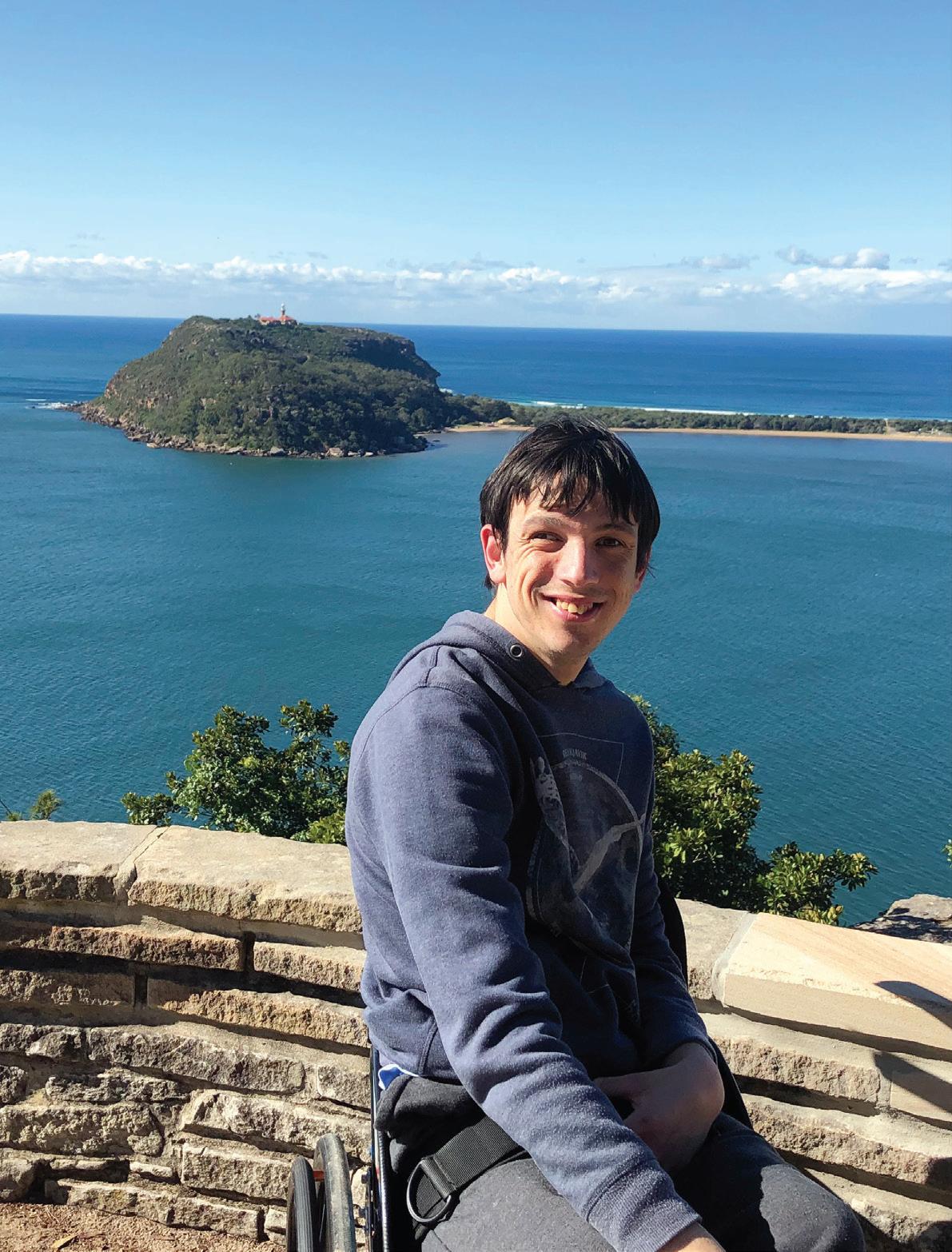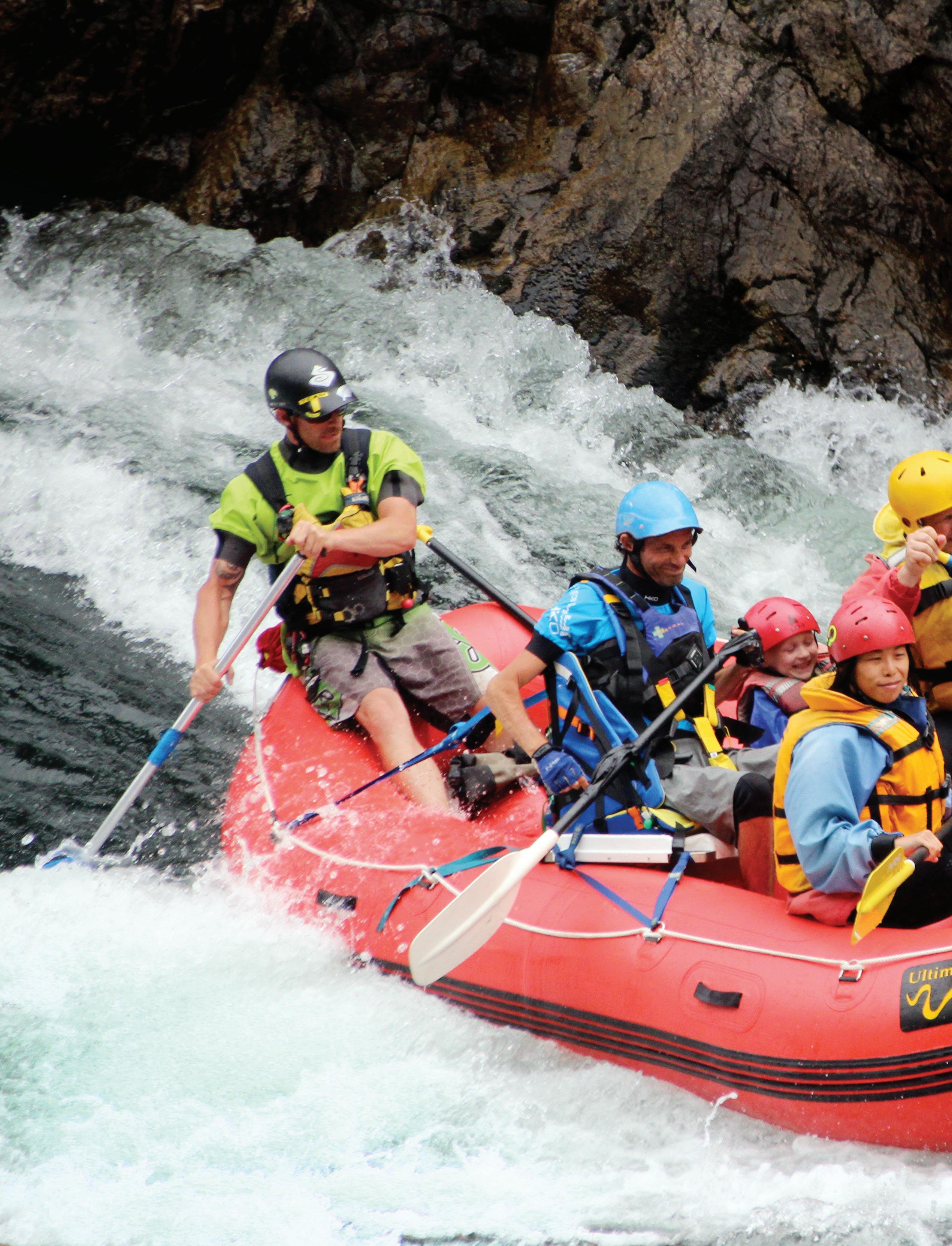
17 minute read
Making Trax
Hearing Impairment
Vision Impairment
Advertisement
Wheelchair Accessible
Jezza Williams loves to push the limits of adventure. We spoke to him about his not for profit company Making Trax, which connects travellers with inclusive and accessible adventures in New Zealand. WORDS: SOPHIE CULLEN
Rafting Buller River Murchison with Ultimate Descents NZ
TRAXMAK NGI
ALL INCLUSIVE BUT NOT EXCLUSIVE
Jezza Williams has an impressive haul of experiences and accomplishments jammed in his travel pack, most likely alongside a skydiving parachute. He’s been an international river guide, ski patroller, canyoning guide, rafting and kayaking specialist and parasailing instructor. Not to mention Jezza’s role as founder and head of Making Trax, a pioneering non-profit that connects travellers with inclusive and accessible adventure experiences in the New Zealand wilderness.
Whether it is travelling from London to Mongolia in a Toyota Yaris, or organising a seven-day adventure through class five rapids on an African river, Jezza Williams has been pushing limits his whole life.
“I don’t travel because it is easy,” he says. “To ‘adventure’ is to undertake a task without knowing the outcome; it is about learning from doing, about expanding our horizons.”
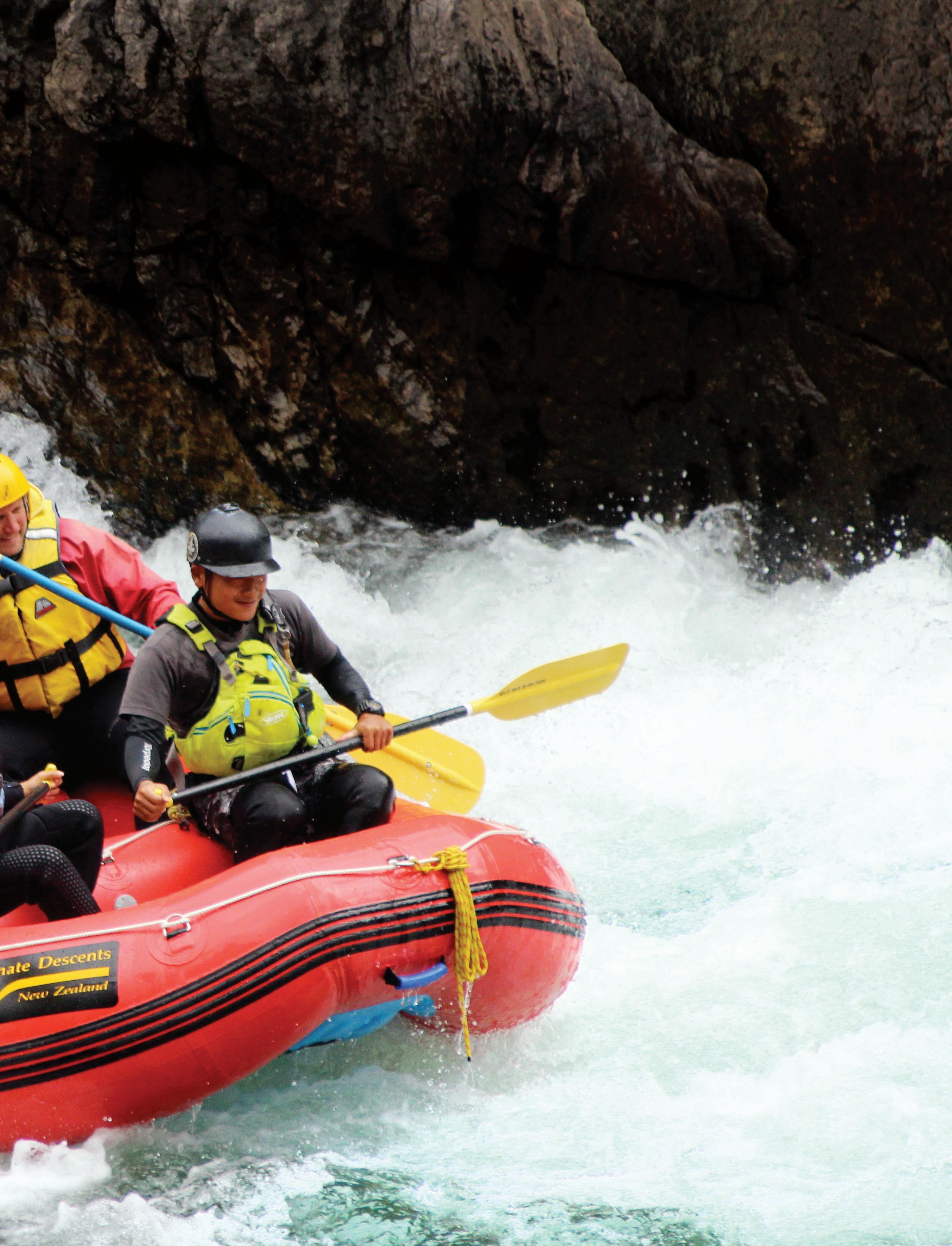
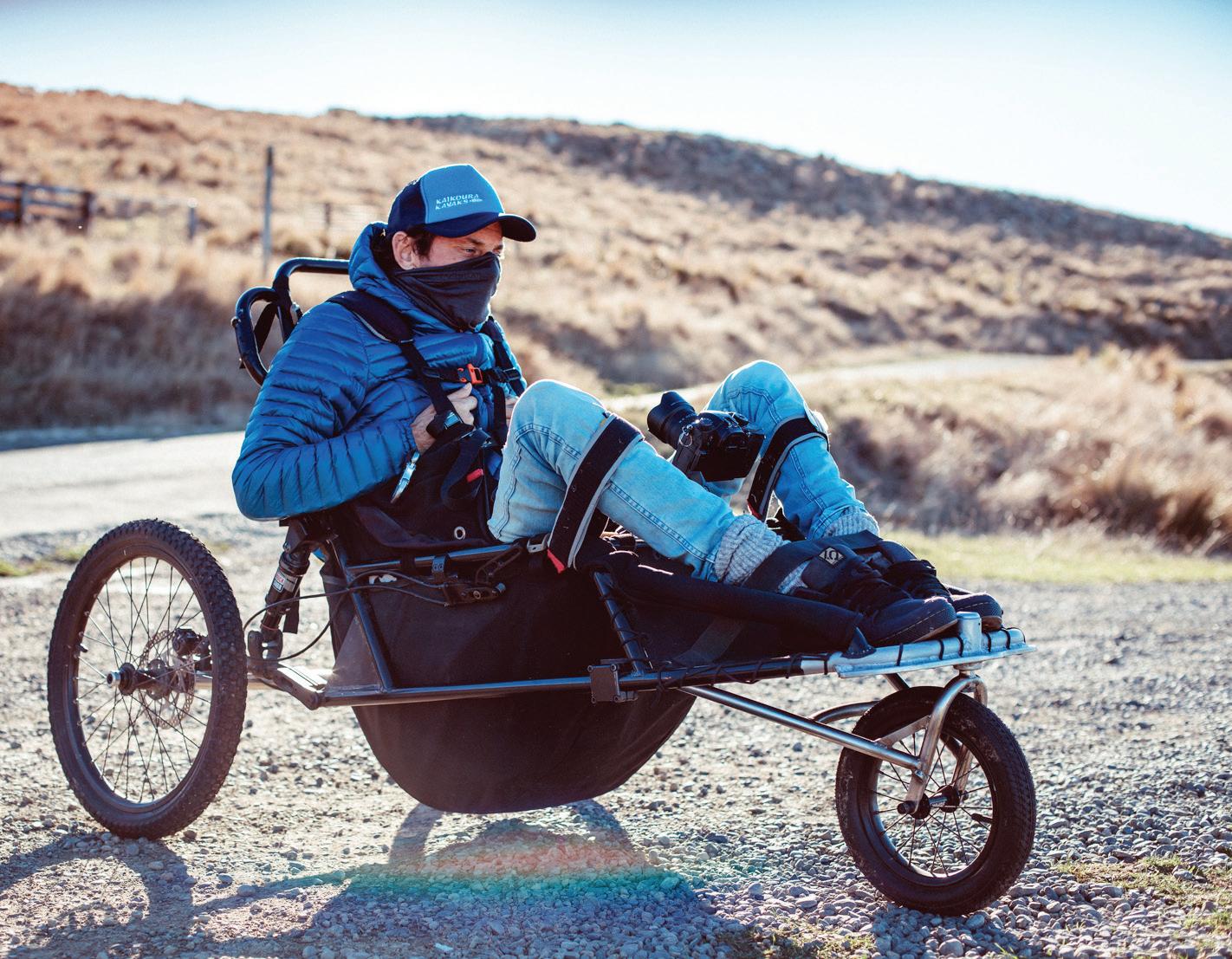
Following a severe canyoning accident in Switzerland when he was 35, Jezza had to push the limits even further to get back outdoors doing what he loved.
“I went in and I started adapting bits and pieces, including harnesses, so that my body – which is C5 tetraplegic – could actually do all these activities.”
He was lucky to have a network of mates, strong resolve and insider knowledge, he says, because upon first looking into the industry there wasn’t much available for someone with tetraplegia. Drawing from years of experience as a river guide, Jezza started up a website and began running small expeditions for people who inquired.
“I’ve always appreciated giving an experience to somebody who hasn’t been able to have that before. Being in this position, I thought – of course! I can open up this industry in a way not many others can because they don’t have the knowledge, they don’t like taking risks or they don’t know the industry as I do.”
It wasn’t long before, in 2012, Making Trax was born. The non-profit inclusive tourism organisation operates on four main principles: information; education; cooperation and adaption if absolutely necessary.
When it comes to the ‘information’ side of things, travellers can visit the Making Trax website for an expansive directory of providers who have the Making Trax seal of approval. Jezza has done extensive work reviewing the offerings of these companies, educating them about best practice in adapting to client needs and helping them vet their services for different participants.
Jezza emphasises that Making Trax is not a booking agency, but rather a facilitator.
“People can organise their own trips,” he
Paragliding Taylors Mistake, Christchurch
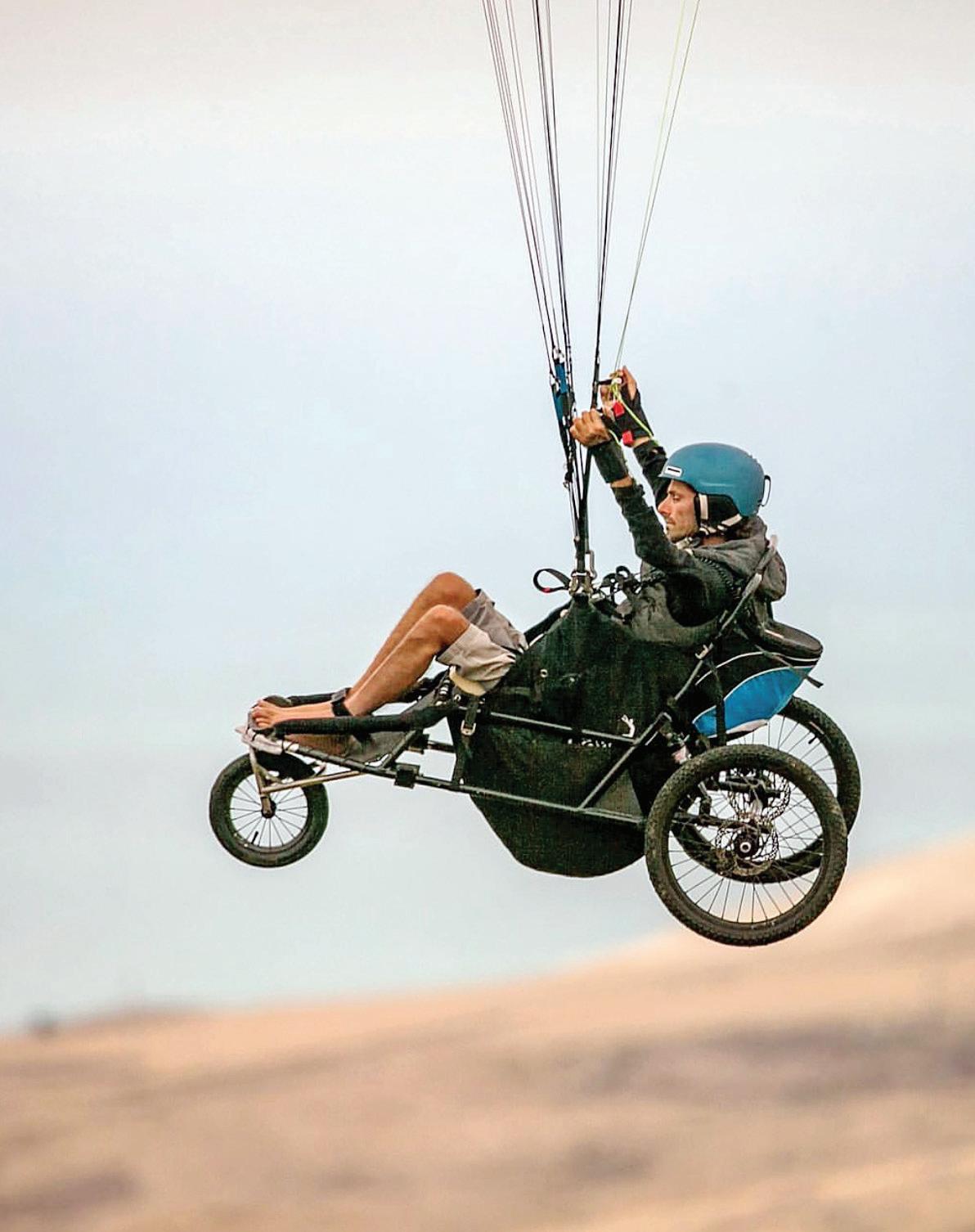
says, “but if they need assistance or want information, it is easy for me to give them a few pointers. I’m the link between the company and the client.”
Most of the activities, equipment and their providers come personally tested by Jezza. Sea kayaking is a top recommendation of his, especially in Abel Tasman National Park or alongside seals in Kaikoura.
“It is a piece of cake because we’ve got harnesses that are fully releasable, very safe and stop abrasion and pressure on your skin,” says Jezza. “I use them myself.”
Other popular choices include rafting, canyon swings, helicopter rides, paragliding and, of course, snow sports with New Zealand’s ‘phenomenal’ adaptive ski programs.
“There are so many different experiences that we can provide for clients,” says Jezza. “And if they want to do something that’s not even on [the Making Trax directory], I can organise it.”
One experience recently coordinated by Making Trax has turned out to be a particular hit. Jezza’s team has helped fly clients with mobility restrictions in a helicopter over the Southern Alps and up onto Franz Josef Glacier. “We have a wheelchair that I’ve made with skis on it, which can break down. You just bring the cushion from your wheelchair, then get out onto the ice and experience a freeze in the middle of winter.”
The modus operandi of Making Trax is addressing adventure experiences on a case-by-case basis. It recognises that travellers with disabilities know their own bodies and can make their own decisions provided that they, and the companies they use, have the correct information.
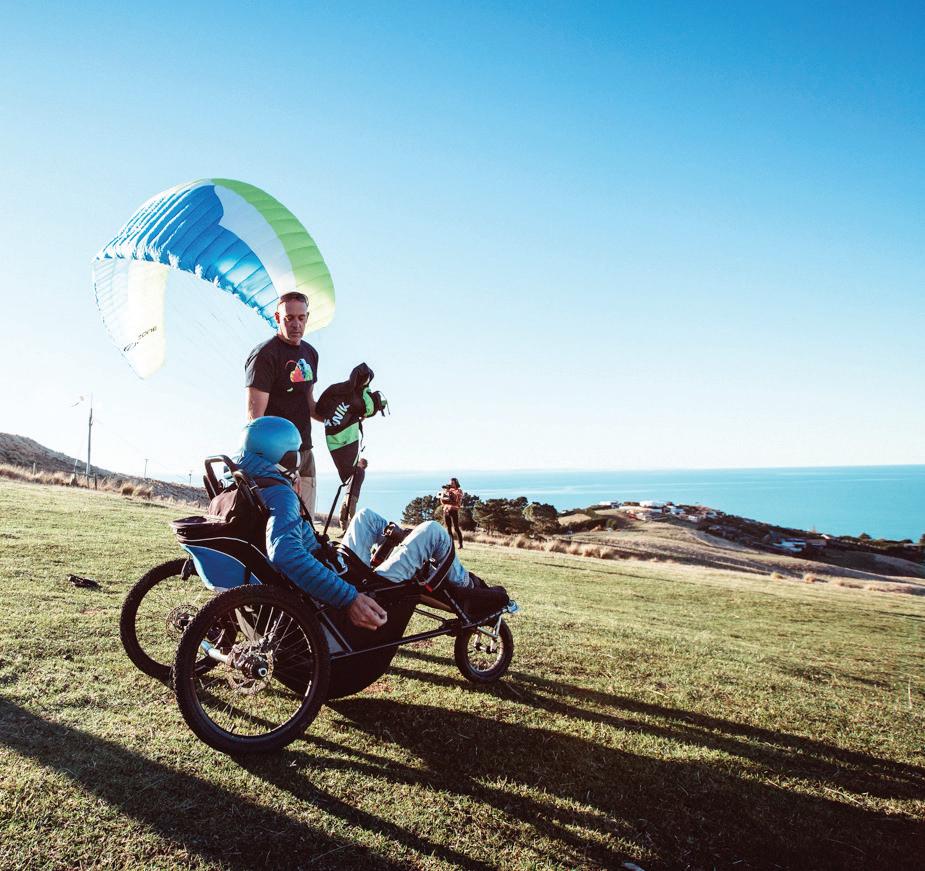
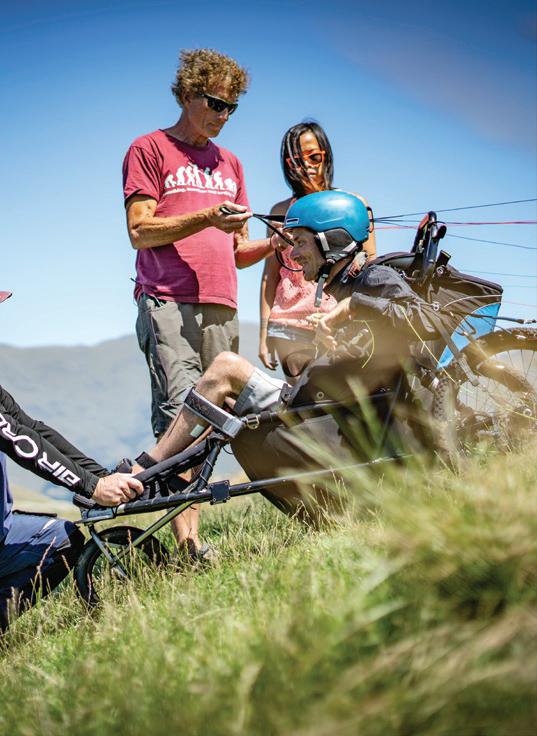
Above and left:
Paragliding Taylors Mistake, Christchurch Right: Tasman Glacier, Mt Cook National Park
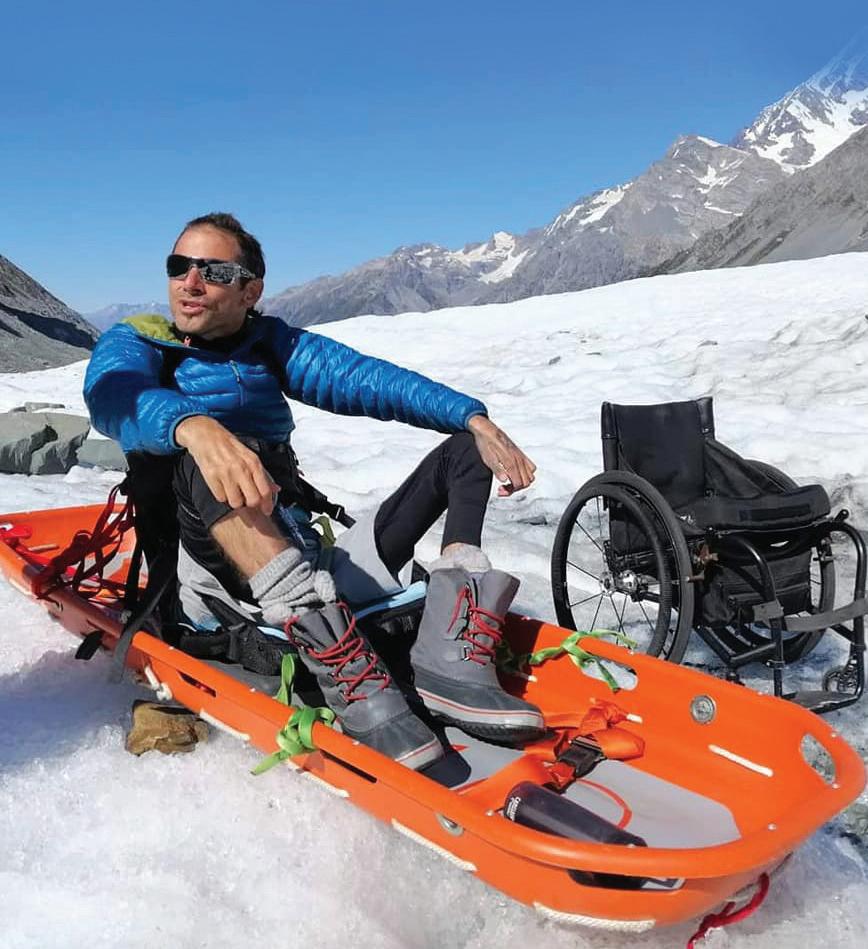
Making Trax is a pioneer of the ‘inclusive tourism movement’, which Jezza ardently distinguishes from accessible travel.
“The difference is that we look at everybody,” he says. “I want anybody off the street to go into an outdoor business and be able to enjoy an experience safely, practically and easily.”
The emphasis is not on barriers but rather on being flexible and making things work even if they initially appear inaccessible.
Paragliding or skydiving might not be deemed ‘accessible,’ but they are inclusive, Jezza says. That is, they might pose some difficulties for people with disabilities, but that doesn’t mean those people are excluded from participating. In fact, for a keen skydiver with mobility restrictions, all it takes is a harness that holds your knees to your chest.
With inclusive tourism in mind, when we asked Jezza to pick an awesome adventure destination outside of New Zealand, he didn’t skip a beat in naming Nepal.
“I’d call it that Kathmandu, Nepal is more inclusive than Christchurch, New Zealand,” he says. “Definitely not as accessible, but more inclusive. You can have a driver who will look after you. You can get guides who are worth their weight in gold. Everything is made possible because of the people who are willing to help.”
He also gushes about the diversity of adventure experiences available, ranging from rafting to paragliding and everything in between. “You can go down and check out the jungle, which is 75m above sea level, or you can go right up to Annapurna and into the hills.”
When it comes to wilderness and adventure travel, however, there’s no one place that Jezza lauds above all others. He says it is about “understanding that everywhere you are, there are opportunities. It’s just the way you look at the opportunity.”
This is what Jezza and Making Trax does ; offer people an open-minded, solution driven approach to adventure, whether they are seeking one or hoping to provide one.
“I realise it is not always easy,” says Jezza, “the thought of doing something you haven’t done before and the anxiety of organising it. You think, why would you?”
So, to get to the nitty gritty of inclusive adventure travel, why would you? And why should you?
“Because it is a tool, it is an experience, it is a memory,” says Jezza. “[Adventure travel] is a place to push your limits. You will lose a pair of shoes or you’ll wear out a pair of tyres, but you’ll never lose an experience. Freedom to adventure, that’s what it’s all about.”
Wonsie works wonders
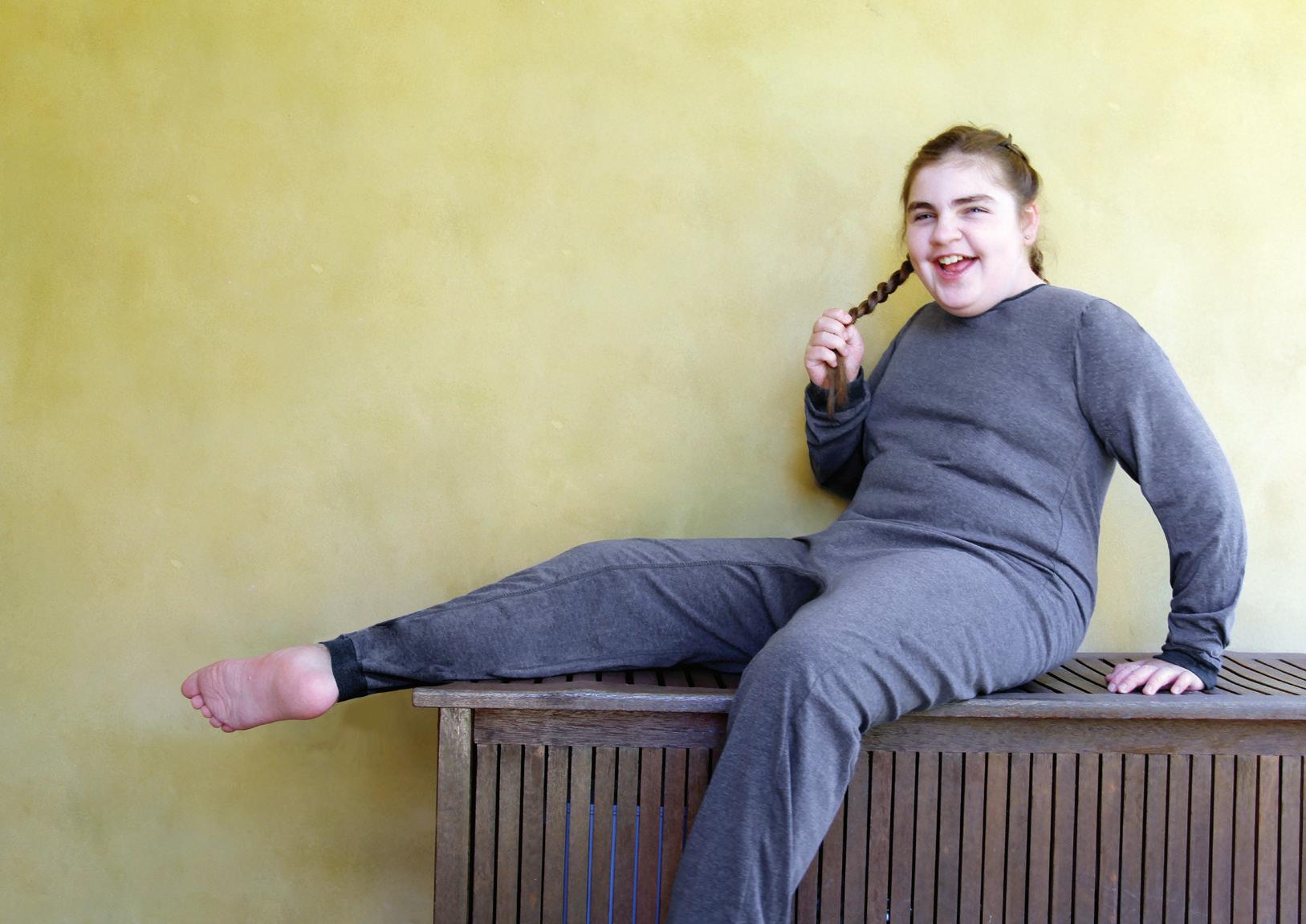
It all started 9 years ago, when a friend of Julie O’Donovan needed bodysuits for her 5 year-old son Zac, who has Autism. She needed something that would help prevent Zac from accessing his nappy, but he had outgrown the sizing options available from most brands.
Drawing from experience with established Aussie brands and her passion for designing products which make a difference, Julie kickstarted ‘Wonsie’. The Sydney-based garment brand now produces a range of large sized bodysuits which help families across the world.
Julie is excited about their newest offering. Wonsie has just introduced at last a full leg length bodysuit with a back zip. You can choose between long-sleeved and sleeveless versions. Wonsie is also shaking up their range with new colour choices.
“I am also doing seasonal colours which will bring a bit of excitement to our basic offering, which I know our customers will love.” says Julie. “Red will be available around September in a few of our styles.”
Wonsie produces a range of soft cotton garments that are comfortable, breathable and great for preventing undressing and nappy access. The Basic Range is ideal for everyday wear, coming in a variety of sleeve lengths. Back zip styles are designed to deter the serial undresser and can also double as a pyjama at night. Wonsie also boasts tube feeding styles with tummy access.
Wonsie bodysuits are available in sizes ranging from toddler to large adult. In fact, Julie has recently received great feedback from adult customers who have successfully used Wonsie products postinjury or post-operation.
Wonsie is a registered NDIS provider and has an online form to make ordering simple. Visit the Wonsie website wonsie.com.au to explore the full range of products.
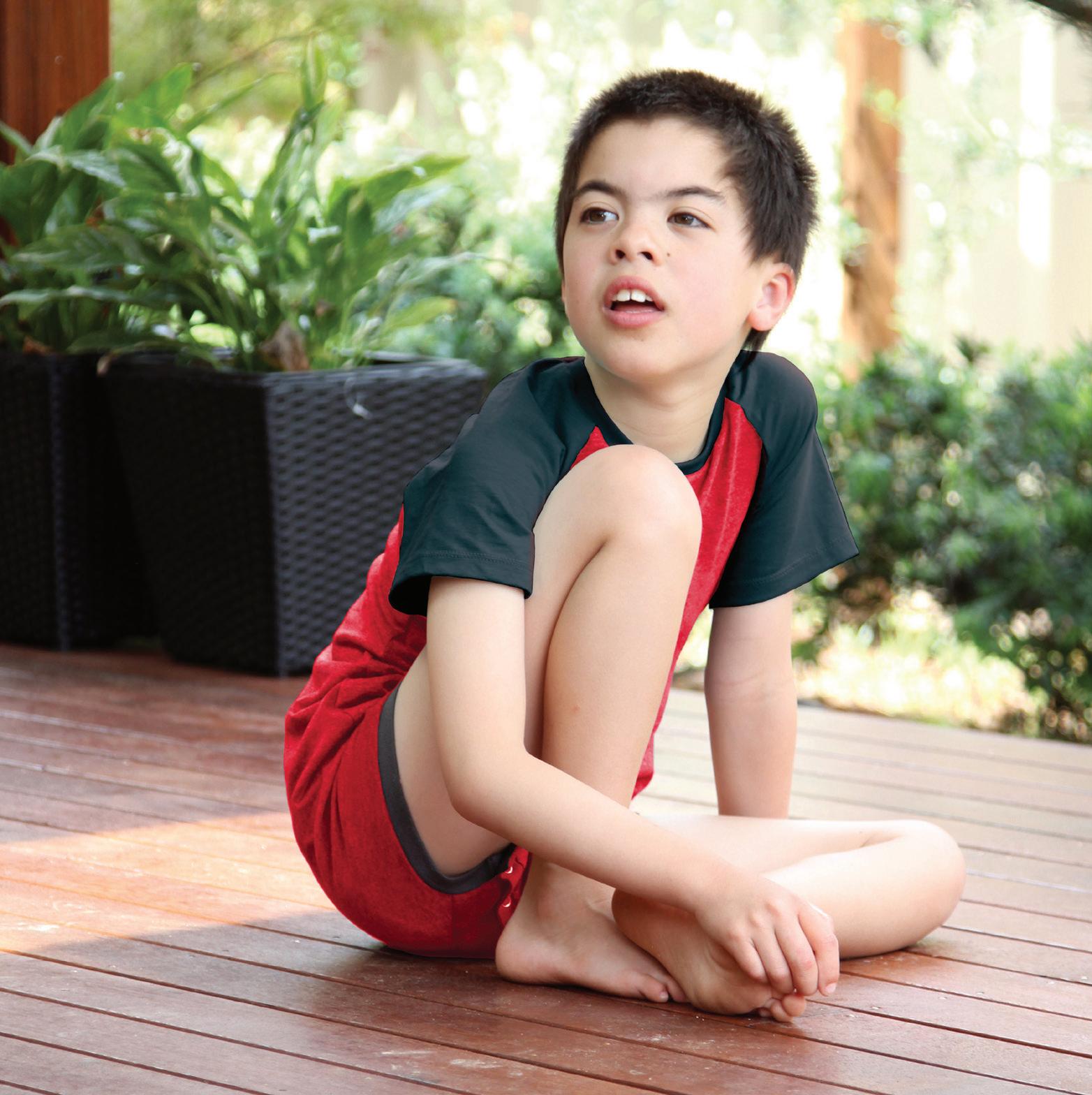
Hoisting made easy
SMART 150 HOIST
Smart 150 a light, foldable (without tools) and transportable hoist Where do you want to go? Don’t let your hoist hold you back. The Smart 150 can assist you even for the shortest of trips. This foldable patient lifter is small enough to fit in the boot of a small car - such as a Toyota Yaris. So you can take it on a road trip - overnight or for as long as you like. When travel restrictions ease, travel overseas by plane or cruise ship.
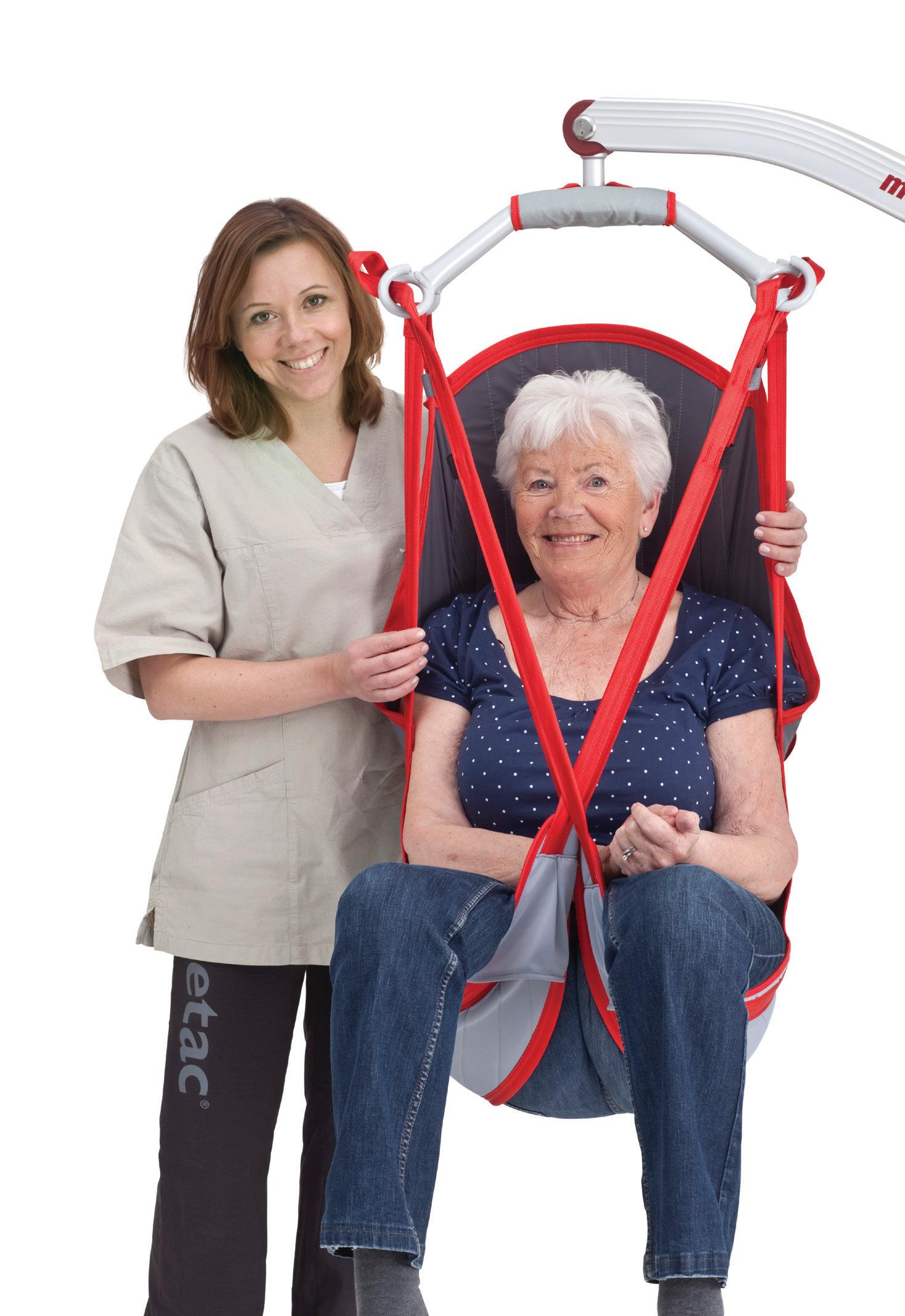
COMPACT SMARTNESS
The Molift Smart 150 can be easily wheeled and transported to where it is required. It is designed for home care, travelling and easy storage. The Smart 150 can be folded, stowed and transported by one person without the use of tools. Due to its low weight (25kg), small footprint and clever design Molift Smart 150 is easy to manoeuvre even in narrow spaces.
The hoisting range of 270–1680 mm provides an excellent maximum hoisting height and at the same time gets very low. Transfers are possible to and from: the floor, a wheelchair or chair, a bed, a toilet or commode.
The 4-point sling bar is standard and guarantees the patient hoist gives a comfortable lifting position for the user with ample space around the head area thereby eliminating any risk of the head bumping into the sling bar or the user swinging side to side. Molift also offer a range of quality slings to assist with a variety of transfer situations, including toileting and showering. With the combination of sling and sling bar, the user will slide into a natural, correct seating position, from lying to sitting and vice versa.
The Molift Smart 150 has a lifting weight capacity of 150 kg, making it suitable for many users. It also provides an excellent centre of balance.
Travel with a soft case for protection against scratches. Use the hard case for full protection, making it ideal for aircraft stowage.
For peace of mind, built-in software calculates when the lifter requires servicing. An emergency stop button is easily accessible, and a manual lowering function can be used in the event of an electrical error.
Molift transfer solutions are designed to be the best in class when it comes to product quality, reliability and durability. The Molift Smart 150 has been awarded for Design Excellence by the Norwegian Design Council.
Contact Patient Handling to arrange a trial or find your local distributor – call 1300 137 875 or email info@ patienthandling.com.au. Patient Handling are a registered NDIS provider and are following COVID Safe guidelines.
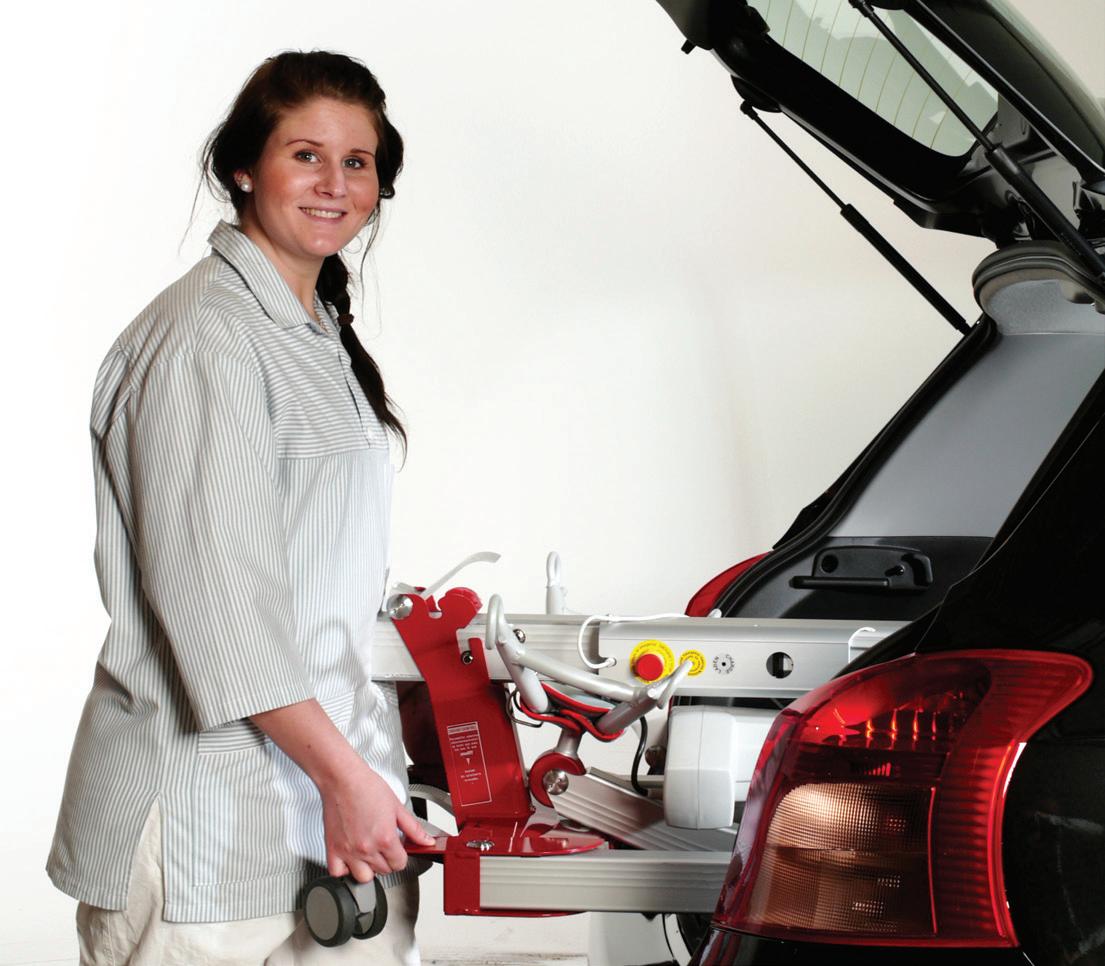
100 Grounded nomads The impact of COVID-19 on those who travel for a living
102 Kids’ picks
104 Virtual travel experiences
106 Tips for COVID-safe travel
108 Top tips for TrailRider fun
109 Directory
Agora in Valencia, Spain @spintheglobe
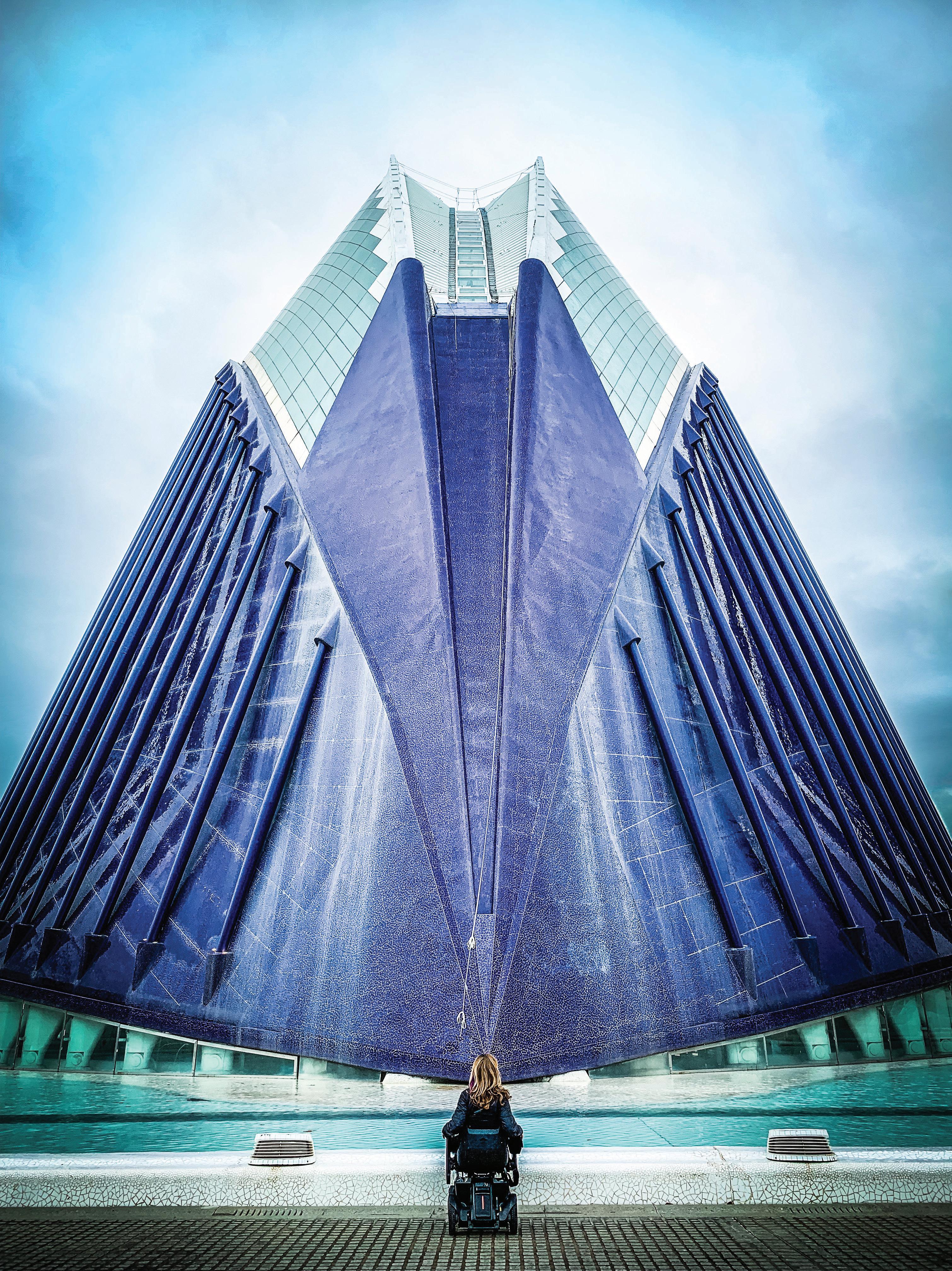
3 GROUNDED NOMADS
The impact of COVID-19 travel restrictions have hit millions. But what about the people who travel for a living? The ones who live a nomadic life, heading off to another city as if they were ducking out for a loaf of bread. We spoke to 3 nomads who’ve been grounded for most of 2020.
JOHN MORRIS
Before January 2020, John Morris was on the road 365 days a year. After all, when you’re only at your apartment 5 days of every month, it doesn’t make much sense to hold onto it.
John Morris is the founder and author of Wheelchair Travel, and also hosts the Accessible Travel Talk Show. Like many others who travel extensively for their profession, his life changed considerably when travel ground to a halt due to COVID-19.
We caught up with John and two other USbased nomads, Cory Lee and Sylvia Longmire, to hear about how a global pandemic transformed their 2020 calendars. From voice acting and podcasts to exploring regional destinations, they’re all continuing to indulge their passion for hitting the road.
“This is the longest I’ve been grounded since my car accident,” says John, who became a wheelchair user eight years ago and has since documented his travels on his blog, Wheelchair Travel.
He may not have new destinations to cover of late, but he is still providing fresh content to his readers.
“With this extra time and being in one place for months on end, I’ve been able to put together [a podcast],” says John.
“My goal with that is to connect disabled travellers with the industry and also the reverse; connect the industry with experiences of disabled travellers.”
His podcast is called The Accessible Talk Show.
John considers it a blessing that he has no urgent need to travel and can stay safe at his home base in Florida. Until he can travel again, John has been looking locally for ways to improve accessibility. He has in fact started a consumer advocacy organisation focused on people with disabilities, named the Accessible Travel Advocacy Center.
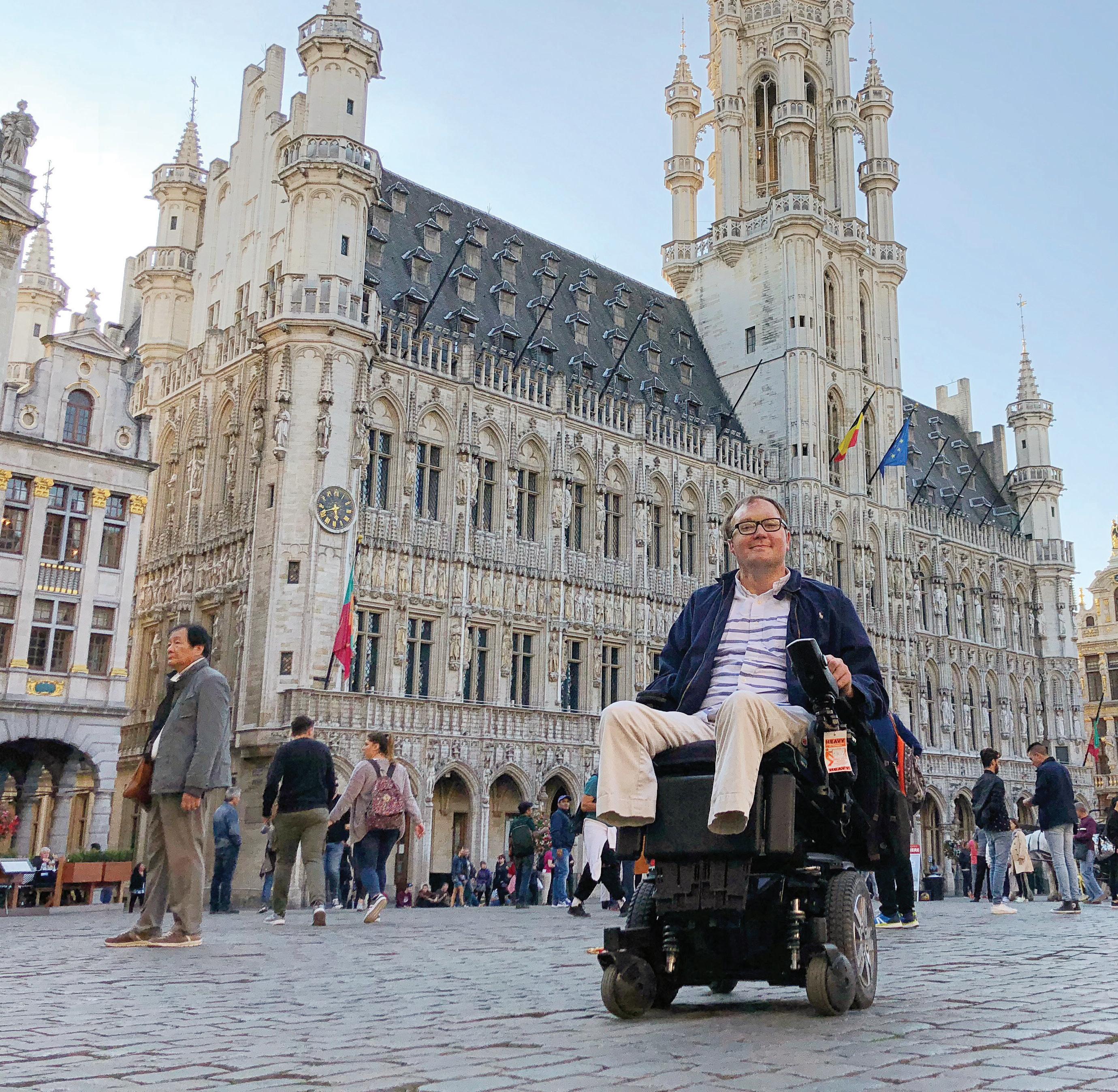
CORY LEE
Cory Lee of Curb Free with Cory Lee also had his plans overturned. He has cancelled several trips, including to Belgium, New Zealand, Costa Rica and Japan and a Curb Free group trip to Portugal.
“I’ve travelled a lot in the past 6 and a half years since starting my blog,” says Cory. “Now, I’m finally getting to see places that are a bit closer to home. I’m discovering new places that I wouldn’t have seen if the pandemic hadn’t happened. There are still some fun trips to be had.”
Based near Atlanta, Georgia, Cory had recently visited the Great Smoky Mountains National Park in Tennessee and the accessible trails in Shenandoah National Park when we spoke.
“I also went to an alpaca farm in north California. I was able to see alpacas all weekend and stay in a cabin. It was such a unique experience and probably not something I would have done pre-pandemic.”
Travelling locally has allowed Cory to continue his blog posts, social media channels and Facebook Live.
“People enjoy seeing that I’m getting out there and having a little bit of adventure, but being as safe as possible and promoting that,” he says.
Cory has also just published his first children’s book, Let’s Explore with Cor Cor, making travel with a wheelchair visible for kids. It was released in July 2020.
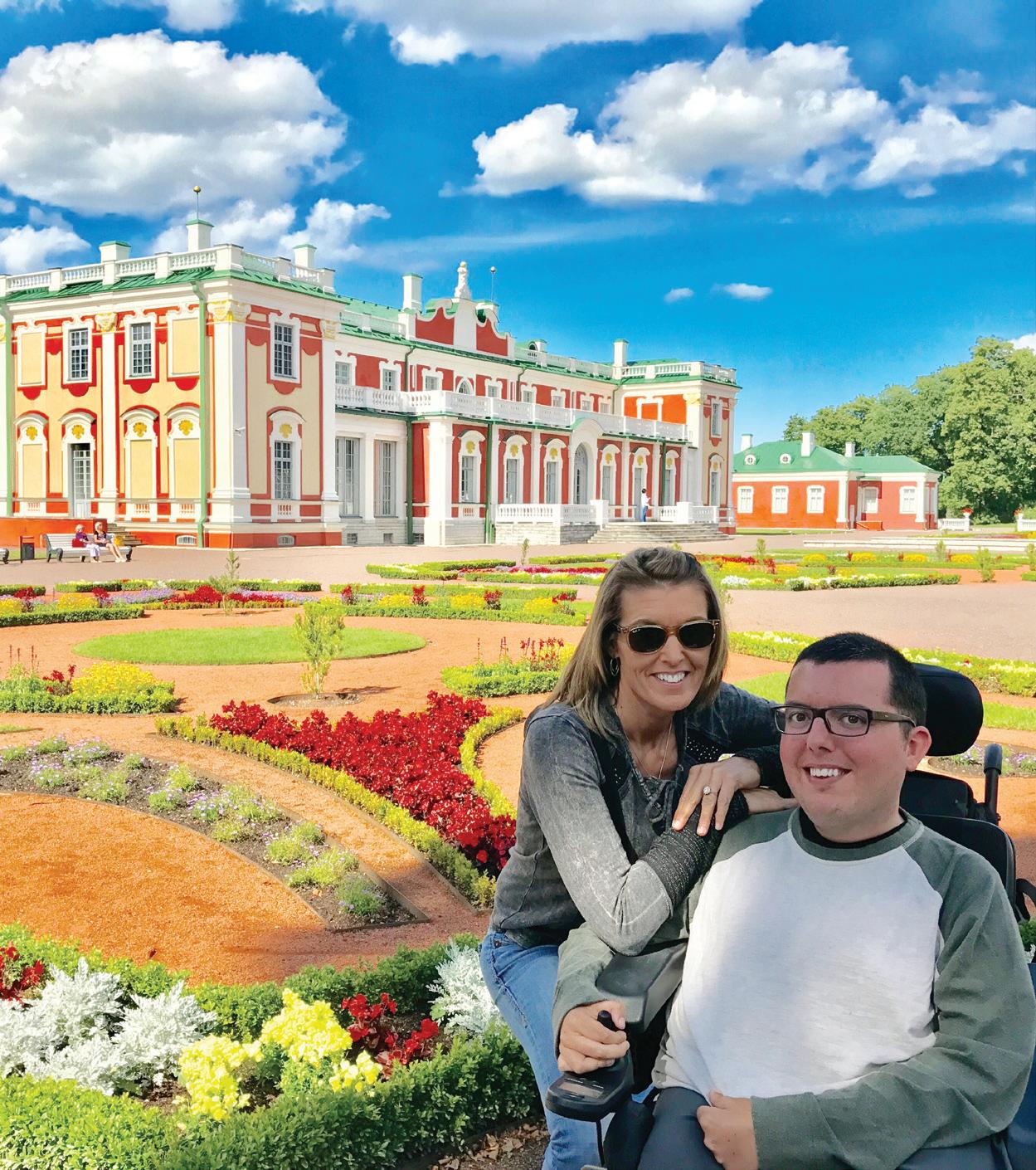
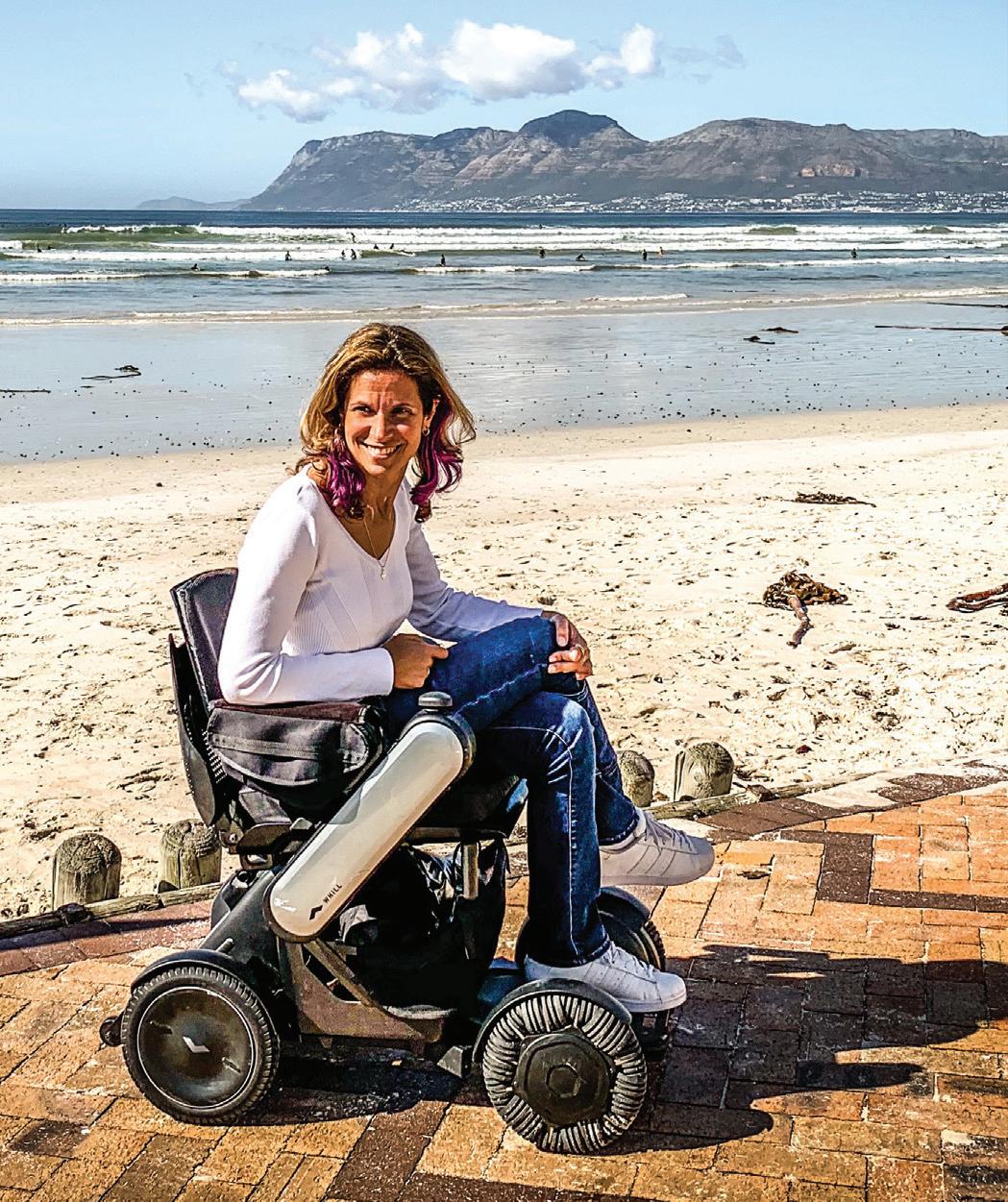
SYLIVA LONGMIRE
Sylvia Longmire of Spin the Globe is no stranger to a diversified career. She is an author, blogger, speaker, Air Force veteran, former Ms. Wheelchair USA and an analyst on Mexican drug wars and border security. Since COVID-19 postponed recent travel plans, she has added several feathers to her cap.
“Do you know the expression, ‘throw spaghetti on the wall to see if it sticks’?” Sylvia asks. “You just go for it and see if it works out!”
Used to travelling for four or five months of the year, Sylvia struggled being confined at home in lockdown. She noticed that a local studio was offering online acting classes. Having connected pre-COVID with a talent agent and producer about developing an accessible travel documentary series, Sylvia reasoned that some acting experience would be useful. Eighteen jobs and a wardrobe home studio later, she now considers voice acting her new “job description.”
Lockdown has also given Sylvia the chance to partner with Tik Tok to produce motivational and educational video content about disability and to increase her writing in disability advocacy on platforms such as Medium.
They may not be able to leave the USA, but neither Sylvia, Cory nor John have stopped exploring. Anxiously but optimistically waiting for travel to resume, they’re all dreaming and scheming their next projects and destinations!
Follow these grounded nomads on Facebook John Morris: @wheelchairtravel Cory Lee: @CurbFree Sylvia Longmire: @spintheglobeonwheels
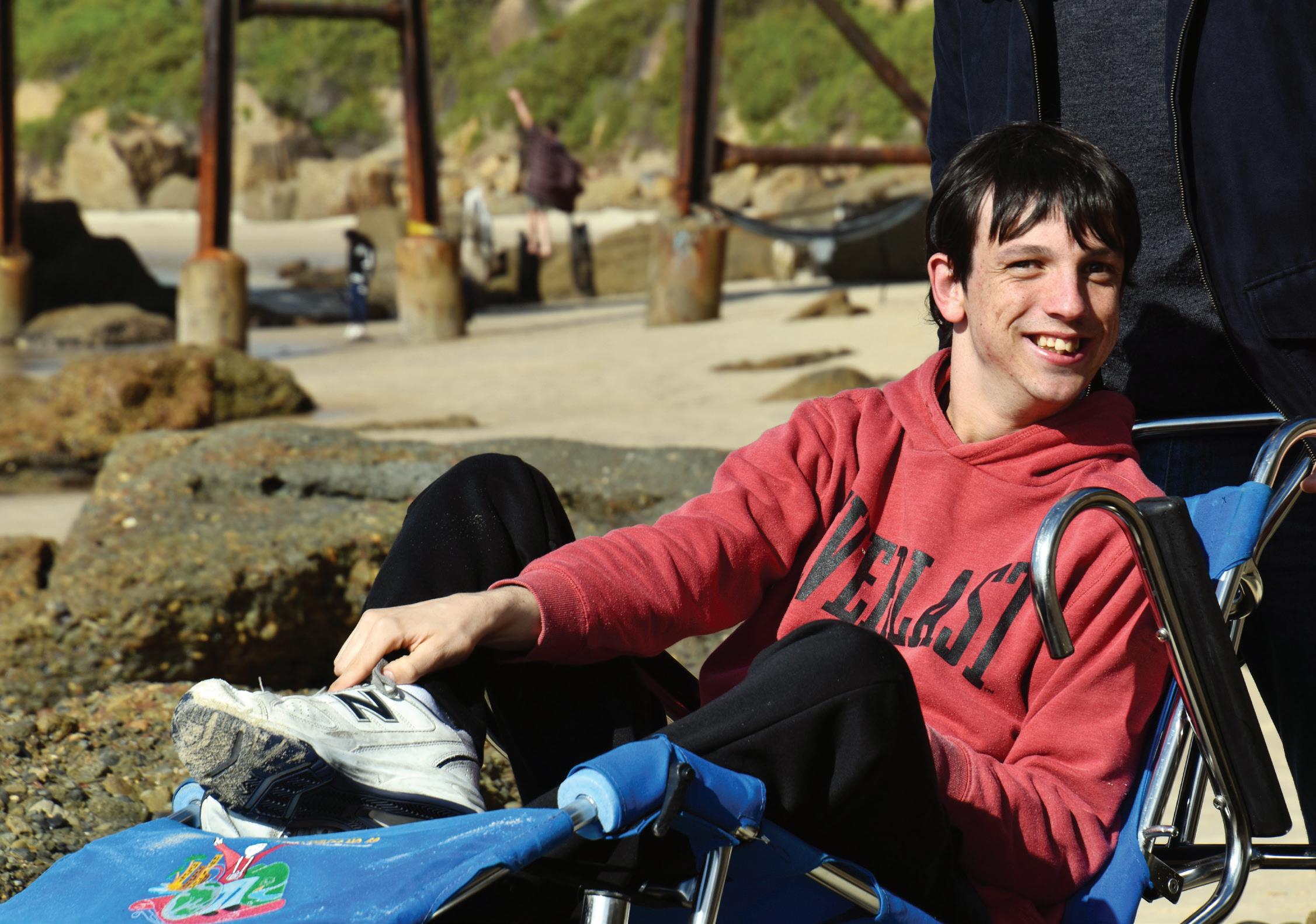
TRAVEL HEALTH & SAFETY DURING COVID
WORDS: JULIE JONES
A COVID-free world is what we all hope for in the future, but unfortunately it appears this will take time. If, like our family, you have been isolated for a long time, you’re probably keen to take those first tentative steps to getting back out and about. We travelled recently, and although nervous, we were rejuvenated from getting back to what we love. While travelling we remained hypervigilant and discovered travelling during a pandemic requires additional planning.
Here are our top tips.
HEAD OUTDOORS
Australians are fortunate to live in a country filled with wide-open spaces and our family has been making the most of nature by exploring our national parks and beaches. It’s easy to socially distance and with warmer weather on its way there’s no better reason to spend time outdoors.
Clockwise from top: Beach fun at Catherine Hill Bay, Mlak key locked bathroom facility, Catherine Hill Bay, West Head Look out Ku-ring-gai Chase National Park
ACCOMMODATION CHOICE
We choose to stay in self-contained accommodation which gives us greater control over our environment. Although it’s nice to have housekeeping and the frills of a hotel, staying in a cabin or home stay avoids crowded lifts and the risks associated with hotel staff entering the room during our stay.
BOOK AHEAD
Spontaneity is curbed for now with reservations required for cafes, restaurants and attractions. Most businesses direct customers to online reservations but if you’re using a Companion Card for a tourist attraction, phone bookings are often necessary.
CONTACTLESS OPTIONS
We avoid touching items which are used by many people by carrying our own pen for signing in at venues and referring to online menus.
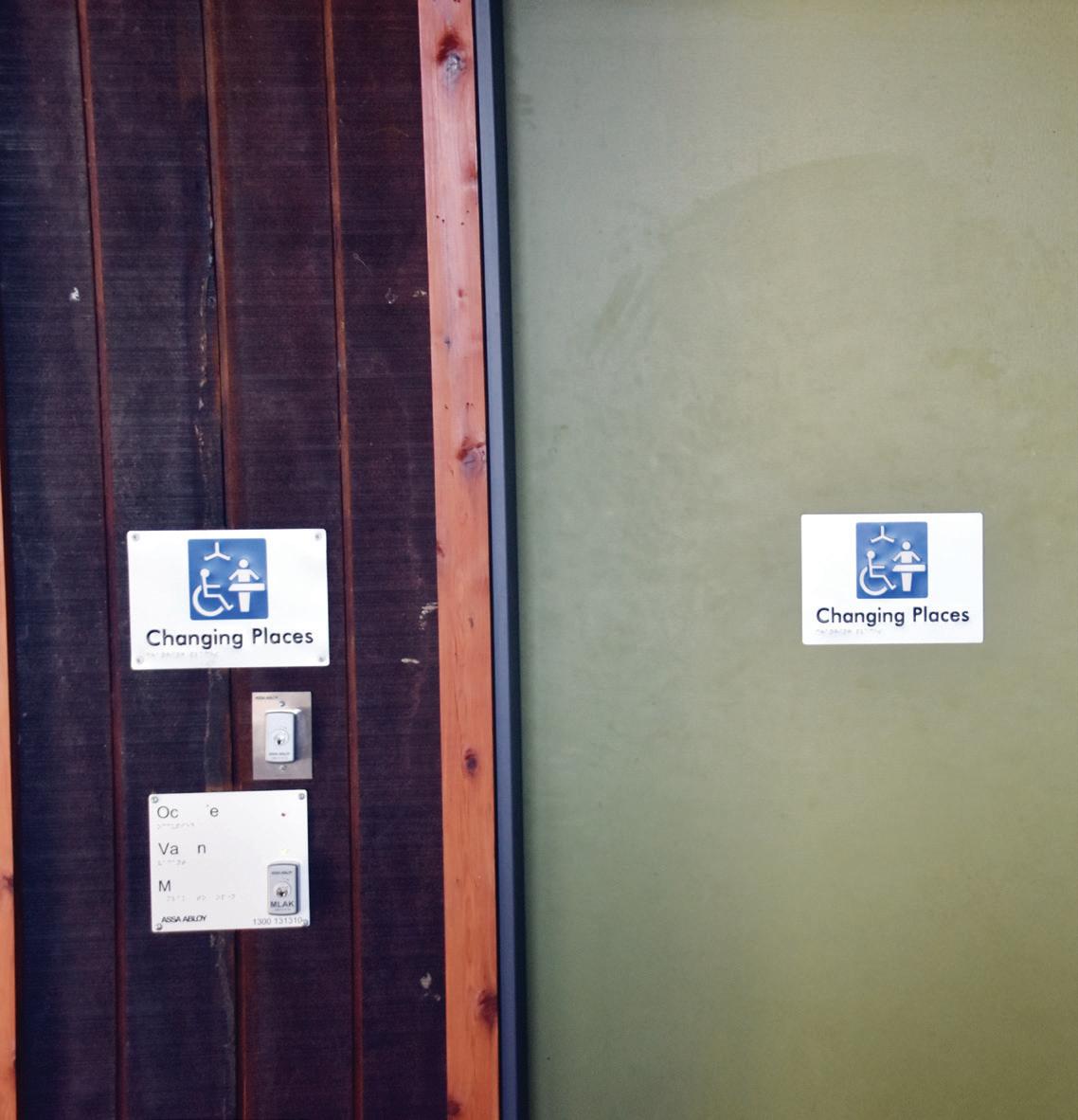
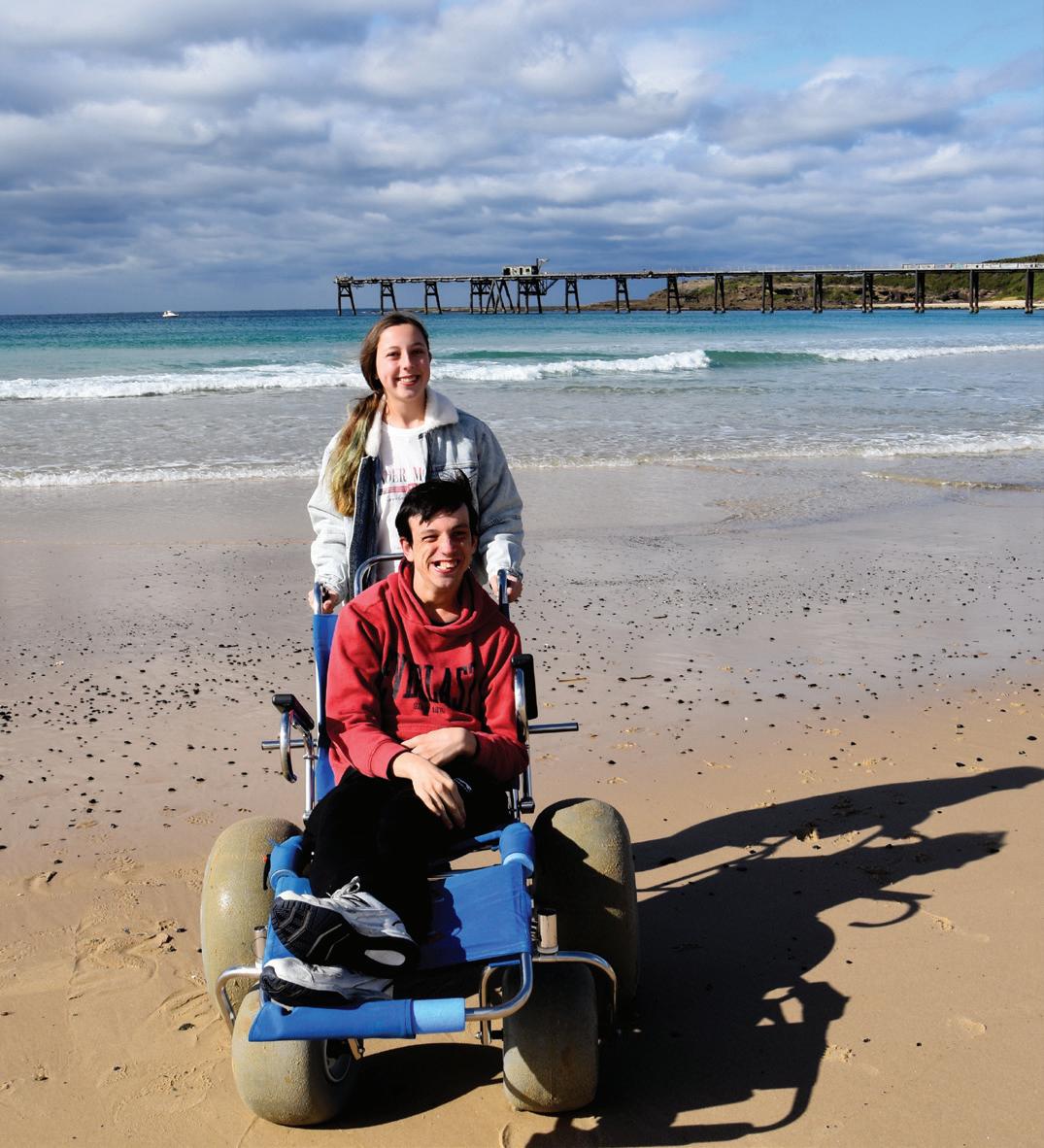
A MLAK KEY HELPS
Using the bathroom before leaving home is a good idea but using a public bathroom is often unavoidable. We carry a MLAK key which opens accessible locked bathroom facilities. These are not used by as many people, hopefully making them more hygienic.
CLEANING & HYGIENE
Antibacterial wipes, hand sanitiser and gloves are packed in our son’s wheelchair for easy access and we wash the wheels and rims of his chair regularly with warm soapy water. Where possible we don’t bring his wheelchair indoors (obviously this is not possible for everyone).
ROAD TRIPS
When road tripping we avoid going into petrol stations by using the BP me app and always wear a glove when using the bowser. A pump pack of hand sanitiser sits in the door of the car for quick hand cleaning before touching the steering wheel. A tablecloth is always packed in the car for road-side stops to use on picnic tables or surfaces where we can’t use antibacterial wipes.
We know It’s a lot of extras to think about when accessible travel is already more time consuming but we’re finding the additional precautions are becoming second nature. And the benefits of being out and about again are worth the effort.
